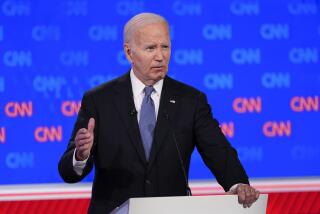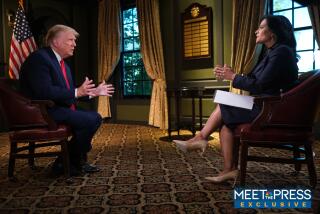Coverage of Bush, Dukakis Reflects Cycles in Media
- Share via
Robert Lichter was blunt.
In the weeks following the Republican National Convention, said Lichter, director of the Center for Media and Public Affairs, “Michael Dukakis got the worst press (on TV) of anyone since Gary Hart.”
Network news broadcasts described Dukakis’ campaign performance negatively more than 80% of the time from Aug. 19 and Sept. 2, Lichter’s tabulations show. In contrast, the networks described the performance of the once supposedly awkward George Bush positively 70% of the time.
What happened? Had the candidates suddenly changed? Had the supposedly cool, well-managed Dukakis campaign become incompetent overnight, and the troubled Bush campaign dramatically better? Is Bush about to clobber Dukakis?
The answers reveal the often ephemeral and transitory factors that drive such shifts in media perception, where reality is a mix both of what is and what is merely believed. And in the cyclical world of political journalism, where news requires that things always change, a new shift in media perception may already have begun.
In truth, say journalists and campaign officials, the Bush campaign did change. It is now better managed, has more money, and has become more deft at staging for TV. And Bush apparently is more comfortable and feeling freed from the shadow of Ronald Reagan.
Perspectives Altered
But much of the difference in media coverage too is that Dukakis fell behind in the polls, which altered how reporters saw things. While being vague on issues may have seemed a cunning way to sit on a lead, it struck reporters as inept when Dukakis was behind.
And that change was reinforced because the Dukakis organization did not have a quick retort to a barrage of Bush attacks, and was outstaged in television events on the important Labor Day weekend.
Dukakis may be putting some problems behind him, and Bush’s improved image operation may not be enough in itself to master the art of media manipulation. Last week, for instance, Dukakis managed to get his message and his sound bites on the network news shows four of five nights, while Bush succeeded only once on NBC and CBS, only twice on ABC.
“The press is already becoming overly self-conscious (of its recent coverage), and now we are about to see a new cycle begin,” Georgetown University professor Michael J. Robinson said.
The previous cycle, however, belonged to the vice president.
“Bush has dominated the dialogue for most of the last three weeks,” declared the New York Times in an analysis piece Sept. 3, while Dukakis has “stalled.” In the Los Angeles Times that day, Bush was “suddenly resurgent” and Dukakis “battling to regain the initiative.”
Even senior Dukakis aide Francis O’Brien conceded last week: “Bush has been campaigning better.”
Baker Given Credit
Much of the credit for Bush’s turnaround has gone to the new campaign chairman, former Treasury Secretary James A. Baker III, whom aides described as a decisive man now firmly running a campaign that weeks ago was marked by factionalism.
But there is far more to it than that.
First, consider money. For months, the Bush campaign effectively had none, because it had spent so much early in the primaries that it got dangerously close to the federal primary-season spending limit.
Now, flush with $46 million in general election federal funds (granted to both sides), Bush’s staff has nearly doubled in size since July 1, according to speech writer Bob Grady, who joined in August.
And that money and staff means the campaign can do better advance work, the invisible but expensive art of political staging. Among those hired, for instance, was Steve Studdert, who headed Reagan’s advance team in 1980 and is considered an extraordinary talent in the vocabulary of visual political metaphor.
On television, goes the theory, only when the pictures are filled with reinforcing political symbols do the words in the speeches mean something.
More Than Pictures
It is more than picking a good backdrop. It also means securing the crowd so that only supporters are let in, building the stage, painting the banners, getting the high school bands to perform, renting the right kind of sound system, and providing the right kind of lights for the time of day.
Bush’s images do seem stronger. His best and most dramatic visual was his Sept. 1 cruise through Boston Harbor to deliver an environmental speech at Dukakis’ doorstep. The flotilla drifted slowly by a sewage plant while Bush from the top deck of one boat declared Boston’s “the dirtiest harbor in America.” The picture combined compelling motion, aggressiveness and interesting backdrop.
“No newspaper and no television in the country can resist superior visuals,” press secretary Sheila Tate said. “I can almost predict when a pix (picture) is going to be front page, and when it’s going to lead the news. And it often has very little to do with news value. It has to do with the strength of the visual.”
Bush himself also is better, reporters and staff agree. The vice president, they say, often seems more comfortable on the stump since becoming the party leader at the convention.
“It’s like a shell has come off,” deputy press spokesman Alixe Glenn said.
But many reporters say this may change again, as David Hoffman of the Washington Post suggested in a story last Monday headlined, “Bush’s Off-the-Cuff Bloopers Are Back, So to Speak.”
No Change in Dukakis
What has happened in the Dukakis campaign is more subtle. “He didn’t change,” Dallas Morning News correspondent Carl Leubsdorf said, “the polls changed.”
Dukakis in turn was condemned, perhaps appropriately, for failing to change with them.
“If a guy is running across the country being vague, staying out of trouble, being Reagan-like, it looks like a smart way to shore up a lead,” NBC correspondent Chris Wallace said. “If you are 10 points down (in the polls), it looks like you’re missing a bet.”
Is that entirely fair?
“You can’t cover a campaign in isolation,” ABC’s Sam Donaldson said. “Nor do I think you would want to.”
So when Dukakis initially declines to respond to a string of harsh attacks by Bush and then changes his mind amid sliding polls and negative publicity, Donaldson said, “You put the story in that context.”
Ongoing Process
But the process--polls begetting media coverage begetting campaign response begetting more polling--is self-perpetuating, say reporters and political pros. The polls show a change in fortunes. News reports then question whether the campaign strategy is flawed. That in turn may start to worry the candidate and staff, which also gets reported. Then if polls show that the slide has not subsided, the process intensifies.
“It feeds on itself,” NBC’s Wallace said.
The Dukakis campaign acknowledges that it compounded its difficulties by making tactical mistakes.
When the Bush campaign decided to “go negative” against Dukakis after the convention, “the Dukakis people just stood there for awhile,” CBS correspondent Bruce Morton said.
Dukakis aides told reporters they thought they could ignore these attacks and run a more positive race. They admit now they were wrong.
“We weren’t complacent,” O’Brien said. “I think we just didn’t realize we were entering a new phase.”
Around Labor Day, presidential races do indeed enter a new phase, becoming much more direct dialogues between the two candidates.
“Before, the networks relied much more on pundits to explain what it all means,” Lichter said. “Now the candidates themselves carry much more of the coverage going after each other. And Bush looked much better on the offense than Dukakis did on the defense.”
Dukakis’ advance staging for the cameras also seemed to fail him.
While Bush was at Boston Harbor, for instance, anti-abortion demonstrators disrupted Dukakis rallies in Philadelphia and Niles, Ill. On television, the disruptions came across as a metaphor for a troubled campaign.
Dukakis’ advance organization has shown signs of improvement. The next time Dukakis came to Philadelphia to deliver a foreign policy speech, for instance, he did so in a union hall basement, where the campaign could carefully control who was let in.
Keeps Protesters Away
And when faulty advance work led to Dukakis having to confront loud Bush supporters in an aircraft engine plant outside Cincinnati last Monday, Jack Weeks, Dukakis’ longtime trip director and a veteran advance man, immediately flew to Sterling Heights, Mich., where the governor was to give another defense plant speech the next day. This time, protesters were kept far away, TV crews got dramatic pictures of Dukakis riding an M1A1 tank, and the speech came off with barely a boo.
Still, “they don’t know TV, not as well as Bush,” said one network producer privately.
Part of the problem seems to be Dukakis himself.
“You can’t imagine how much of the planning each night for the next day is the human element,” O’Brien said, “making sure the candidate is comfortable, or convincing him to do something.”
Take Dukakis’ appearance at the Los Angeles Police Academy on Friday. During a firing range exhibition, the governor once again demonstrated his habit of turning away from the cameras, nearly blowing a chance to visually suggest a tough stance on crime.
“He has the most photographed back in America,” ABC producer Pat Sullivan said.
But Dukakis, while forgetful of the camera, is rarely awful. On a bad day, Bush can be far worse.
Bush Confuses Dates
Consider Bush’s temporary confusion two weeks ago over the date of the Japanese attack at Pearl Harbor, or his misstatement on camera Friday that he hoped he stood for “anti-Semitism.” CBS on Friday even did a story about Bush’s verbal gaffes.
What’s more, no amount of imagery alone will make news.
On Monday, for instance, Bush spoke in front of stacked boxes of pink beans, olive oil and cream of coconut at the Goya Foods factory in New Jersey--a backdrop thoughtfully designed to evoke economic bounty and speak to ethnic audiences. But the story that night on the evening news was all about one of Bush’s aides, Frederic V. Malek, who resigned after the Washington Post reported that he had inventoried the number of Jews at the top of the Bureau of Labor Statistics for the Nixon Administration in 1971.
The next two days, too, Bush failed to say anything sufficiently newsworthy to earn him a story on the network news.
Another factor in the inevitably cyclical nature of press coverage, said Robinson of Georgetown, is that the press, in an effort to try to remain balanced, tends to lean harder on a candidate who has enjoyed a run of good press.
And the candidates themselves help drive media cycles.
“Someone who lags behind begins to be energized,” Bush press secretary Tate said.
In the end, however, it is as if the media is zigzagging across the story, and balance comes from averaging it all out.
“When we were ahead we were this invincible group of managers,” Dukakis aide O’Brien said mockingly. “When we were behind it is that we are in a great deal of difficulty. I don’t think either of those things are reality.”
Staff writers John Balzar and Bob Drogin contributed to this story.
More to Read
Get the L.A. Times Politics newsletter
Deeply reported insights into legislation, politics and policy from Sacramento, Washington and beyond. In your inbox twice per week.
You may occasionally receive promotional content from the Los Angeles Times.










